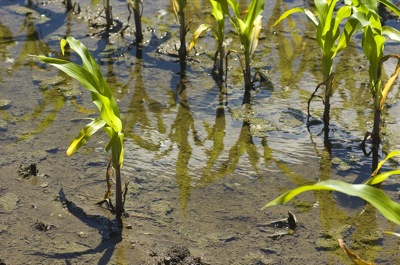Friday, June 18th, 2010
Too much rain hurts crops
By Nancy Allen

Photo by Mark Pummell/The Daily Standard
This corn in a muddy field off state Route 219 east of Montezuma is stunted from too much rain. Area farmers are having difficulty planting soybeans and sidedressing corn with nitrogen because fields are too wet. The weather also has caused mold to grow on wheat.
Too much rain has put a damper on the growing season for some Mercer County farmers, especially those in the northern part of the county, local ag officials said.
Prolonged rains have kept farmers from planting soybeans and applying nitrogen to corn. It also has caused a mold disease in wheat called wheat scab.
"There's a lot of concern out there," said Jim Hoorman, Mercer County OSU Extension educator. "At this point average yields would be great."
Hoorman said some farmers have yet to complete a first planting of soybeans because their fields are too wet. Others who need to replant soybeans due to frost damage in May haven't been able to do that either, he said.
Once the ground dries, farmers will be racing to get all three of these tasks done simultaneously, and that's not good, he said.
Corn has fared better than soybeans, especially if it was planted early, however some is uneven because rains have drowned it out, he said.
"Another thing that's huge is guys can't get their nitrogen on their corn," Hoorman said. "Some corn is very uneven this year because of the rain and it makes it difficult for guys to estimate how much nitrogen to put on."
Hoorman said he's also heard reports of wheat head scab scattered throughout the county.
Wheat is allowed to have a certain amount of head scab in it, but if it goes above that, the price farmers get for it at the elevator drops, Hoorman said. The mold that causes wheat scab also produces a toxin that can be harmful to livestock and poultry to which it's fed.
About 10 percent of the soybean crop remains unplanted in Mercer County, said Chris Gibbs, the county's Farm Service Agency executive director. The final soybean planting date for crop insurance purposes is June 20. If farmers plant after that, their coverage drops, he said.
Producers who are prevented from planting soybeans after June 20 and expect to leave the land bare should contact their local county FSA office to fill out a prevented planting application, he added.
The northern part of Mercer County and into Van Wert is the worst because it got more rain, Gibbs said.
"We got dumped on up
here," said Steve Knapke who farms near Rockford. "There's a lot of acres that ain't got a thing in the ground ... in northern Mercer County and into Van Wert some guys only got half their crops out."
Knapke said he only got about 30 percent of his corn crop planted this year due to the rain. He's been trying to plant soybeans, but hasn't been able to get into his fields for six weeks. Wheat scab is also an issue, he said.
Bob Guggenbiller, who farms near Fort Recovery, said his crops are doing all right.
"We got our first cutting (of alfalfa) done and all the corn is sidedressed," he said. "We're a little more fortunate than some because we haven't gotten as much rain as they did up north."
Coldwater-area farmer Kevin Bettinger said his soybeans look pretty good because he planted them Memorial Day weekend, well after a killing frost that nipped other beans. He has some yellow corn in areas that got flooded.
"I think it paid off to wait to plant beans, but I think I waited too late to plant some of the corn," he said. "The early corn all looks good."
Bettinger said he has seen worse years as far as excess rain, but this is the worst head scab he's seen since 1994. He figures about 40 percent of his wheat has been affected.
It will be tricky to harvest the damaged wheat because the combine has to be set just right. The idea is to blow the head scabbed wheat out the back and keep the good wheat, he said.


